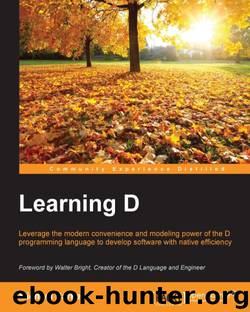Learning D by 2015

Author:2015
Language: eng
Format: mobi, epub
Publisher: Packt Publishing
There are no special requirements on the return value of the front primitive. Elements can be returned by value or by reference, they can be qualified or unqualified, they can be inferred via auto, and so on. Any qualifiers, storage classes, or attributes that can be applied to functions and their return values can be used with any range function, though it might not always make sense to do so.
Forward ranges
The most basic of the higher-order ranges is the forward range. This is defined as an input range that allows its current point of iteration to be saved via a primitive appropriately named save. Effectively, the implementation should return a copy of the current state of the range. For ranges that are struct types, it could be as simple as:
auto save() { return this; }
Download
This site does not store any files on its server. We only index and link to content provided by other sites. Please contact the content providers to delete copyright contents if any and email us, we'll remove relevant links or contents immediately.
The Art of Coaching Workbook by Elena Aguilar(48063)
Trainspotting by Irvine Welsh(20055)
Twilight of the Idols With the Antichrist and Ecce Homo by Friedrich Nietzsche(17705)
Fangirl by Rainbow Rowell(7834)
Periodization Training for Sports by Tudor Bompa(7328)
Change Your Questions, Change Your Life by Marilee Adams(6641)
This Is How You Lose Her by Junot Diaz(5771)
Grit by Angela Duckworth(4736)
Red Sparrow by Jason Matthews(4665)
Asking the Right Questions: A Guide to Critical Thinking by M. Neil Browne & Stuart M. Keeley(4574)
Paper Towns by Green John(4169)
Room 212 by Kate Stewart(4107)
Ken Follett - World without end by Ken Follett(3972)
The Sports Rules Book by Human Kinetics(3588)
Housekeeping by Marilynne Robinson(3401)
The Motorcycle Diaries by Ernesto Che Guevara(3332)
Introduction to Kinesiology by Shirl J. Hoffman(3299)
Exercise Technique Manual for Resistance Training by National Strength & Conditioning Association(3291)
Double Down (Diary of a Wimpy Kid Book 11) by Jeff Kinney(3272)
